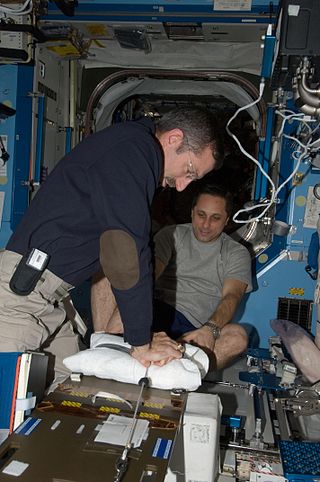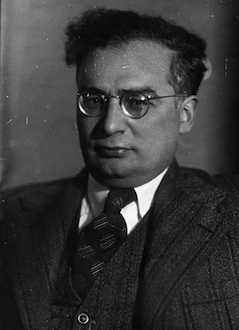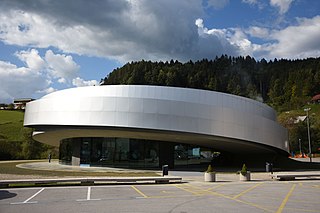Related Research Articles

An astronaut is a person trained, equipped, and deployed by a human spaceflight program to serve as a commander or crew member aboard a spacecraft. Although generally reserved for professional space travelers, the term is sometimes applied to anyone who travels into space, including scientists, politicians, journalists, and tourists.
Human spaceflight programs have been conducted, started, or planned by multiple countries and companies. The age of crewed rocket flight was initiated by Fritz von Opel who piloted the world's first rocket-propelled flight on 30 September 1929. All space flights depend on rocket technology; von Opel was the co-designer and financier of the visionary project. Until the 21st century, human spaceflight programs were sponsored exclusively by governments, through either the military or civilian space agencies. With the launch of the privately funded SpaceShipOne in 2004, a new category of human spaceflight programs – commercial human spaceflight – arrived. By the end of 2022, three countries and one private company (SpaceX) had successfully launched humans to Earth orbit, and two private companies had launched humans on a suborbital trajectory.

The International Astronautical Federation (IAF) is an international space advocacy organization based in Paris, and founded in 1951 as a non-governmental organization to establish a dialogue between scientists around the world and to lay the information for international space cooperation. It has over 390 members from 68 countries across the world. They are drawn from space agencies, companies, universities, professional associations, museums, government organizations and learned societies. The IAF organizes the annual International Astronautical Congress (IAC). As of 2019, Pascale Ehrenfreund has served as the president of the IAF.

Michael López-Alegría is an astronaut, test pilot and commercial astronaut with dual nationality, American and Spanish; a veteran of three Space Shuttle missions and one International Space Station mission. He is known for having performed ten spacewalks so far in his career, presently holding the second longest all-time EVA duration record and having the fifth-longest spaceflight of any American at the length of 215 days; this time was spent on board the ISS from September 18, 2006, to April 21, 2007. López-Alegría commanded Axiom-1, the first ever all-private team of commercial astronaut mission to the International Space Station, which launched on April 8, 2022, and spent just over 17 days in Earth's orbit.

Claude Nicollier is the first astronaut from Switzerland. He has flown on four Space Shuttle missions. His first spaceflight (STS-46) was in 1992, and his final spaceflight (STS-103) was in 1999. He took part in two servicing missions to the Hubble Space Telescope. During his final spaceflight he participated in a spacewalk, becoming the first European Space Agency astronaut to do so during a Space Shuttle mission. In 2000 he was assigned to the Astronaut Office Extravehicular Activity Branch, while maintaining a position as Lead ESA Astronaut in Houston. Nicollier retired from ESA in April 2007.

Thomas Arthur Reiter is a retired European astronaut and is a Brigadier General in the German Air Force currently working as ESA Interagency Coordinator and Advisor to the Director General at the European Space Agency (ESA). He was one of the top 25 astronauts in terms of total time in space. With his wife and two sons he lives near Oldenburg in Lower Saxony.

The British Interplanetary Society (BIS), founded in Liverpool in 1933 by Philip E. Cleator, is the oldest existing space advocacy organisation in the world. Its aim is exclusively to support and promote astronautics and space exploration.

Sunita Lyn Williams, nicknamed Suni in the United States and Sončka in Slovenia, is an American astronaut, United States Navy officer, and former record holder for most spacewalks by a woman (seven) and most spacewalk time for a woman. Williams was assigned to the International Space Station as a member of Expedition 14 and Expedition 15. In 2012, she served as a flight engineer on Expedition 32 and then commander of Expedition 33.

Space medicine is an area in aerospace medicine that focuses on the medical care of astronauts and spaceflight participants. The spaceflight environment poses many unique stressors to the human body, including G forces, microgravity, unusual atmospheres such as low pressure or high carbon dioxide, and space radiation. Space medicine applies space physiology, preventive medicine, primary care, emergency medicine, acute care medicine, austere medicine, public health, and toxicology to prevent and treat medical problems in space. This expertise is additionally used to inform vehicle systems design to minimize the risk to human health and performance while meeting mission objectives.

Leonid Ivanovich Sedov was a Russian physicist who worked as an engineer in the former Soviet space program.

The International Astronautical Congress (IAC) is an annual meeting of the actors in the discipline of space science. It is hosted by one of the national society members of the International Astronautical Federation (IAF), with the support of the International Academy of Astronautics (IAA) and the International Institute of Space Law (IISL). It consists of plenary sessions, lectures and meetings. The IAC is attended by the agency heads and senior executives of the world's space agencies.

A commercial astronaut is a person who has commanded, piloted, or served as an active crew member of a privately funded spacecraft. This is distinct from an otherwise non-government astronaut, for example Charlie Walker, who flies while representing a non-government corporation but with funding or training or both coming from government sources.
The Indian Human Spaceflight Programme (IHSP) is an ongoing programme by the Indian Space Research Organisation (ISRO) to develop the technology needed to launch crewed orbital spacecraft into low Earth orbit. Three uncrewed flights, named Gaganyaan-1, Gaganyaan-2 and Gaganyaan-3 are scheduled to launch in 2024 followed by crewed flight in 2024 on an LVM3 rocket.

Astrophilately is a branch of philately which deals with the collection of stamps and postmarked envelopes related to spaceflight. It is the intersection of space and postal history. Covers cancelled on the date and at a post office near the controlling agency are used in postal exhibits to share the development and conquest of the cosmos.
Spaceflight participant is the term used by NASA, Roscosmos, and the Federal Aviation Administration (FAA) for people who travel into space, but are not professional astronauts.

The Commercial Spaceflight Federation is a private spaceflight industry group, incorporated as an industry association for the purposes of establishing ever higher levels of safety for the commercial human spaceflight industry, sharing best practices and expertise, and promoting the growth of the industry worldwide. Issues that the Commercial Spaceflight Federation work on include, but are not limited to, airspace issues, FAA regulations and permits, industry safety standards, public outreach, and public advocacy for the commercial space sector.

Eric C. Anderson is an American entrepreneur and aerospace engineer. He is the co-founder and chairman of Space Adventures Ltd., the first commercial spaceflight company, which has arranged for eight missions for privately funded individuals to the International Space Station since 2001. Anderson is widely credited as having established the market for commercial spaceflight. He is also a founding partner of Space Angels Network, CEO of Intentional Software Corporation, co-founder and chairman of Planetary Power, Inc., co-founder and former co-chairman of Planetary Resources and chairman of Personal.com and Booster Fuels.

The Cultural Centre of European Space Technologies (KSEVT) is the headquarters of an eponymous institute, promoting research in the fields of space culturalization. Moreover, it is the central cultural venue in Vitanje, where the family of Herman Potočnik Noordung, the spaceflight pioneer, originates from.

The Cyprus Space Exploration Organisation (CSEO) is a non-governmental, nonprofit, science organisation, based in Cyprus, with a global scope of service and activities. Its main functions are research and development, space advocacy, and international cooperation in the field of space exploration, astronautics and astronomy. Education and outreach are also an important part of its mission as International Astronomy Education Center.
References
- ↑ "Dansk Selskab for Rumfartsforskning". rumfart.dk. Retrieved 2016-07-13.
- ↑ "Danish Astronautical Society | Iaf". www.iafastro.org. Archived from the original on 2016-08-17. Retrieved 2016-07-13.